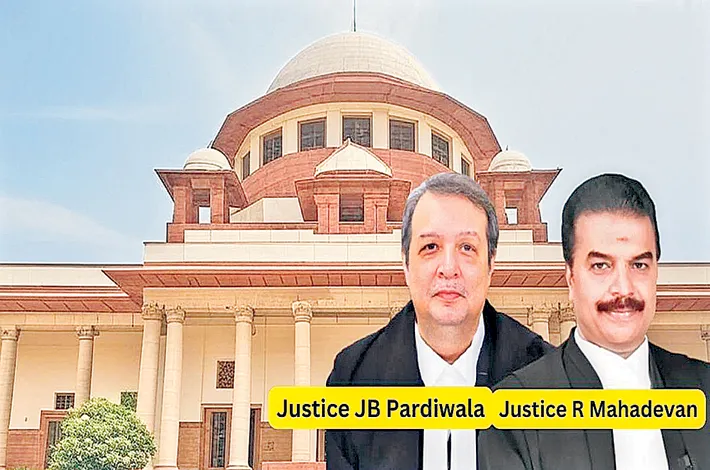Tamil Nadu Guv Case: Judgement uploaded on Apex Court website
13-04-2025 12:00:00 AM

Directive to distribute the judgment to all High Courts and Governors’ offices
metro india news I new delhi
In a significant move, the detailed judgment of 415-pages ruling in the Tamil Nadu Governor case was uploaded on the Supreme Court’s website at 10:54 PM on April 12, 2025, follows the Court's oral pronouncement delivered on April 8. This underscores the Court’s intent to ensure that this ruling serves as a guiding principle for constitutional functionaries nationwide.
By declaring the Tamil Nadu Governor’s actions “not bona fide,” the Supreme Court has set a precedent that could deter similar overreach in other states and thus reinforcing the constitutional balance between state legislatures and gubernatorial authority.
At the heart of the case was Tamil Nadu Governor Dr. R.N. Ravi's controversial decision to reserve 10 re-enacted Bills for the President’s consideration—a move the Court deemed “not bona fide” and legally untenable. Declaring his actions “illegal and erroneous,” the Court set aside the Governor’s reservations and ruled that the Bills shall be deemed to have received assent upon their re-presentation by the State Assembly on November 18, 2023.
The ruling, issued by a bench comprising Justices J.B. Pardiwala and R. Mahadevan, not only settles a constitutional dispute but sends a clear message to all Governors and state authorities across the country. In a move signaling the nationwide significance of the judgment, the Court directed its Registry to circulate copies of the decision to all High Courts and Principal Secretaries to Governors in every state, ensuring its principles are acknowledged across India’s federal framework.
The dispute arose when Governor Ravi withheld assent to 10 Bills passed by the Tamil Nadu Assembly and chose instead to reserve them for presidential consideration—even after the Bills were re-enacted by the Assembly. The Supreme Court ruled that this was an unconstitutional overreach. It also held that any subsequent actions by the President regarding those Bills were “non-est in law,” effectively non-existent.
The Court emphasized that the role of the Governor is not to function as a parallel legislative authority but to facilitate the democratic will of the elected legislature. While the Constitution, under Articles 200 and 201, allows the Governor to reserve Bills under certain circumstances, the judgment clarified that such powers must be exercised with constitutional fidelity and not for political or extraneous reasons.
In an unusually strong rebuke, the Court observed that Governor Ravi acted with a “clear lack of bona fides” and showed “scant respect” for prior constitutional interpretations, including the Court’s own judgment in the Punjab Governor case. It further noted that his actions were influenced by “extraneous considerations,” breaching the boundaries of his constitutional role.
The judgment marks a critical moment in Indian federalism, aiming to curb the misuse of gubernatorial discretion that has increasingly become a source of friction between centrally appointed Governors and elected state governments.
Far-reaching implications
Legal scholars and political observers view the ruling as a turning point in clarifying gubernatorial responsibilities under the Constitution. With instances of Governors delaying or withholding assent becoming more frequent in recent years, the judgment seeks to reaffirm that such discretionary power is not absolute. By declaring the 10 Tamil Nadu Bills as law—deemed to have received assent—the Court underlined the supremacy of the legislature and set a precedent for future disputes.
The Supreme Court’s use of its extraordinary powers under Article 142 to bring clarity and closure to the matter reflects its intent to protect constitutional integrity and reinforce democratic norms.








